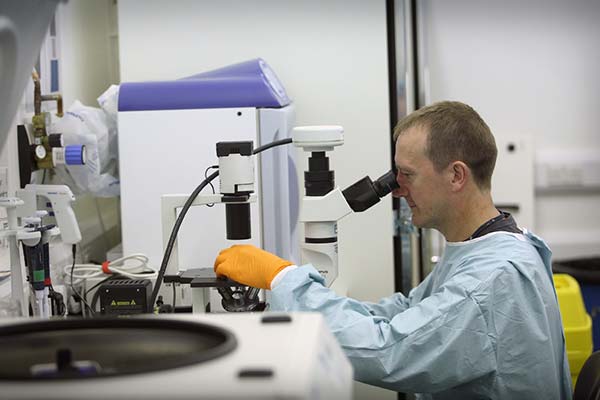 Tumor profiling is the process of scanning the DNA, RNA or protein from a patient’s tumor to understand what molecules are driving the tumor. Knowing about a patient’s tumor profile may help a physician choose a specific drug or clinical trial with a higher likelihood of success.
Tumor profiling is the process of scanning the DNA, RNA or protein from a patient’s tumor to understand what molecules are driving the tumor. Knowing about a patient’s tumor profile may help a physician choose a specific drug or clinical trial with a higher likelihood of success.Over the past two decades, cancer drugs have shifted from the broad use of chemotherapies towards more-targeted drugs designed for patients with specific molecular alterations. Some of the success stories have been truly remarkable, such as Gleevec for chronic myelogenous leukemia and Herceptin for HER2+ breast cancer. As oncologists learn more about the peculiarities of each person’s tumors, they are personalizing medicine to match the peculiarities. For a simple introduction to tumor profiling, watch this video.
Who should have tumor profiling?
Currently, tumor profiling is appropriate only for ACC patients with recurrences or metastatic disease who are considering systemic therapy. There is no need to expend the time, effort and money on tumor profiling unless the test results are useful in guiding treatments.
What is involved?
Tumor profiling starts from a tumor specimen that may be accessed through a biopsy, surgery or a blood sample. The testing is typically ordered by a patient’s treating physician and may take two or more weeks to get a result after the tumor specimen is sent for analysis. The final report is highly technical, so patients will need to have it interpreted for them by a knowledgeable physician. If the report discovers an actionable target (such as a NOTCH mutation), your doctor may suggest a matching targeted drug (such as a NOTCH inhibitor).
Will tumor profiling definitely be useful?
No. There are important limitations to tumor profiling:
- Not all genomic drivers of cancer are known and included in the testing.
- Even if a genomic driver is identified, it may not be actionable (have a matching targeted drug). Less than half of ACC patients are likely to learn actionable information from the testing.
- A matching targeted drug may not be effective or it may have significant side effects.
- Testing may not analyze all tumors in a patient, perhaps missing some genomic drivers.
- Tumors evolve and may develop new genomic drivers, making old test results incomplete and perhaps requiring repeated tests.
Where is tumor profiling done?
Some academic medical centers profile the tumors of a large proportion of cancer patients. Check with your physician to learn if your tumor may be profiled at no cost to you. Alternatively, your physician may contact one of the following companies with established tumor profiling services:
- Foundation Medicine
- Guardant 360
- Tempus
- Caris Molecular Intelligence
- Oncompass
- Personal Genome Diagnostics
Some services may cost $5,000 or more. Depending upon your situation and insurance policy, it may be reimbursed. Check with your physician and insurance company to understand how much tumor profiling might cost you.
In all cases, it is important to consult with a knowledgeable physician to order and interpret tumor profiling reports.
